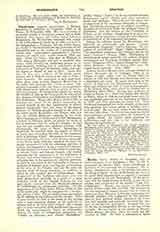

Brassicanus, JOHANN ALEXANDER, a German humanist, b. probably at Cannstatt, 1500; d. at Vienna, November 25, 1539. He was a member of an ancient family of Constance, named Kol or Koll, latinized, Brassicanus, his father being Johannes Brassicanus, the Wurtemberg humanist who taught in the Latin school at Urach up to 1508, and later in the paedagogium at Tubingen, but was chiefly known as a leader in the movement for the promotion of the humanities and as the author of a grammar then widely used, “Institutiones grammatical”, thirteen editions of which were issued between 1508 and 1519. From his father, who died at Wildaad in 1514, Johann Alexander received an excellent education, which brought his intellectual powers to an early maturity, enabling him to matriculate at the University of Tubingen January 13, 1514, and take his degree as Master of Arts in 1517. About this time he first gave evidence of his fertile poetic powers, and in 1518 he received the title of Poeta et orator laureatus. His coronation as poet must have taken place early in 1518, Emperor Maximilian at the same time granting him a coat of arms. The greatest humanists of the time kept in correspondence with Brassicanus, and are loud in praise of his intellectual powers. He lectured for a short time before the Faculty of Arts on the Latin poets; he also edited the eclogues of Calpurnius and Nemesianus which he had discovered. When, after Bebel’s death (1516), a reaction once more set in against humanism, he availed himself of the first opportunity to absent himself temporarily from the scene of his former labors. In 1519 he attached himself to the suite of the royal orator Maximilian von Bergen, who was sent on various diplomatic missions by the king. After a sojourn in the Netherlands (1520) Brassicanus returned to Tubingen (1521) to pursue his study of law in connection with his work as a teacher. In this way he was brought into intimate relations with Cantiuncula, the jurist of Basle. Removing to Ingolstadt, he received there the degree of Doctor of Laws, also succeeding Reuchlin in the important chair of philology (1522). His position in this strong-hold of Catholicity, however, soon became untenable, as he, like so many orthodox minds of the time who openly sympathized with the reforming activities of Luther, was suspected of being a confirmed Lutheran. At this juncture he found friends ready to assist him, in Johann Faber and Johann Gainers, who worked zealously for his appointment to the University of Vienna, and whose influence helped to give a more orthodox tone to his opinions on religious questions. In 1524 he was called to the University of Vienna as professor of rhetoric, next receiving the professorship of the laws of the Empire, and not till 1528 the coveted chair of Greek literature, in addition to which he still retained that of jurisprudence. His disapproval of the Lutheran movement was now most pronounced, partially as a result of a more profound study of the Church Fathers; he was particularly exercised over the disastrous influence of Lutheranism on educational activities. On the appearance of the Turks before Vienna (1529) he fled to his native city, where he remained for a considerable period of time. The succeeding years are marked by his editions of the Fathers and the classics. Often in poor health, he died at the prime of life, leaving only a very extensive library, as his material resources had at all times been meagre. His writings give no clear conception of his intellectual importance which his contemporaries found so noteworthy. Among his works of independent authorship are: “Oratio ad principes post obitum Maximiliani” (1519); “Caesar” (1519); “In divurn Carolum electum Romanorum regem” (1519); and other occasional poems and addresses. These do not rise above the average level of the occasional literature of humanism. No subtler meaning and no original or striking thoughts are concealed under the mediocre forms of expression. For the history of the University of Vienna, on the contrary, Brassicanus is of great importance, being numbered among the most vigorous representatives of the humanist movement. Among the editions issued by Brassicanus, the following are particularly well known: “Luciani Sarnosatensis Tragoediae” (1527); Salviani, “De vero judicio et providentia” (Basle, 1530); Gennadius, “De sinceritate christianin fidei dialogus seu de via salutis humanw” (Vienna, 1530); “Enchiridion de christianarum rerum memories sive epitome historiae ecclesiasticae per Eusebium descriptae auctore Haymone” (Hagenau, 1531); “Salonii Dialog duo” (ibid., 1532); Pothonis, “De statu domus Dei” and “De magna domo sapientiae” (ibid., 1532).
JOHANN LUDWIG BRASSICANUS, younger brother of Johann Alexander (b. at Tubingen, 1509; d. at Vienna, June 3, 1549) went to Vienna with his brother in 1524 and likewise won distinction both as a philologist and jurist. He spent some time in the service of Sigmund von Herberstein and Nicolaus Olah, and obtained the title of court historiographer of the Roman King, after which he studied law at Heidelberg (after 1532). Having been professor of Greek in Vienna for a short time (1534) and likewise in Padua, where in 1536 he was made doctor iuris, he was appointed professor of the Institutes at Vienna in 1537, and later professor of canon law. King Ferdinand summoned him to his council, at the same time granting him letters patent of nobility and a coat of arms. He was twice rector of the university and four times dean. In 1544 he was made provincial superintendent, achieving considerable reputation as a public official. He seldom wrote anything for publication, and left only a few addresses and treatises on legal subjects.
JOSEPH SAUER

